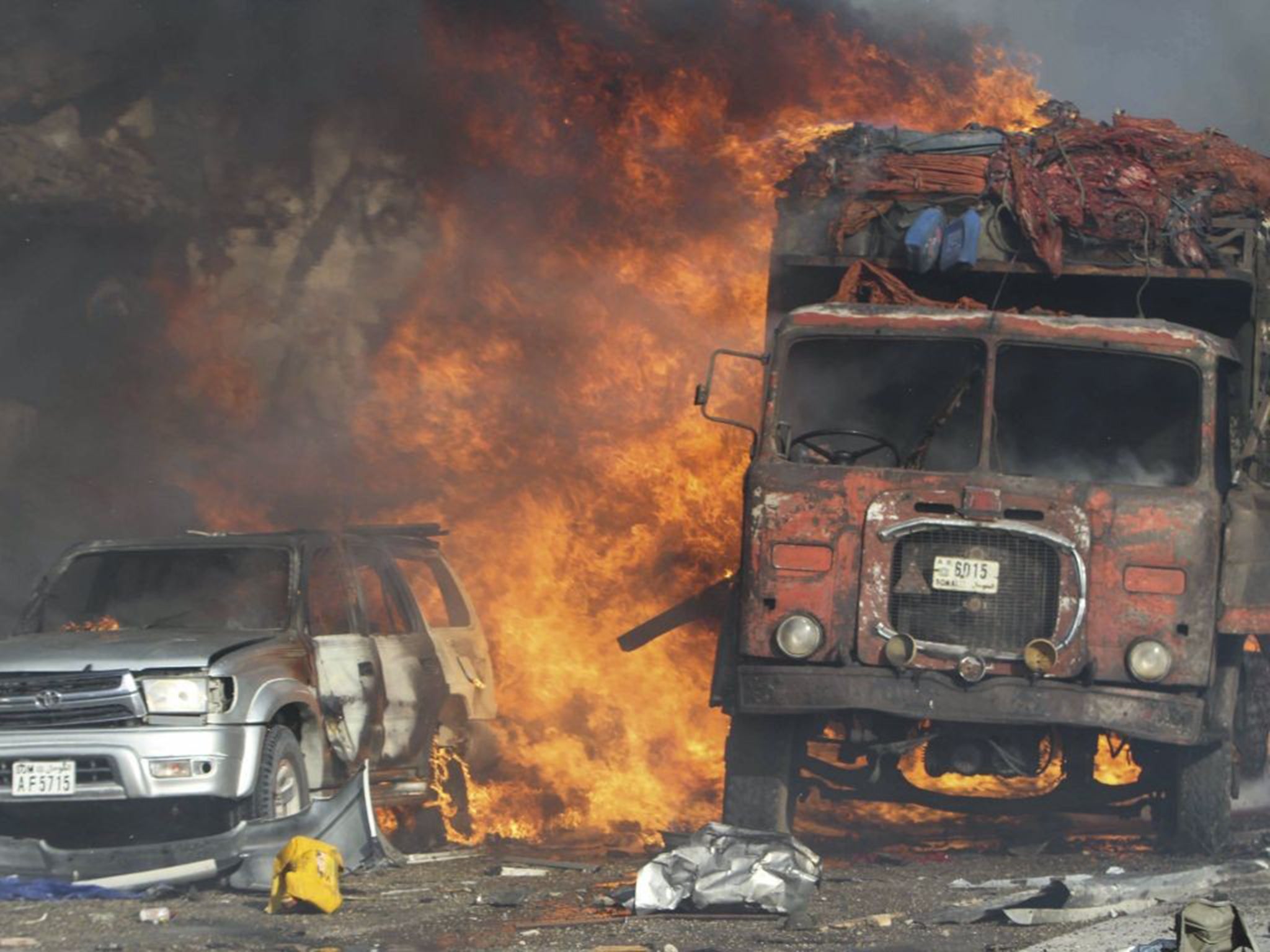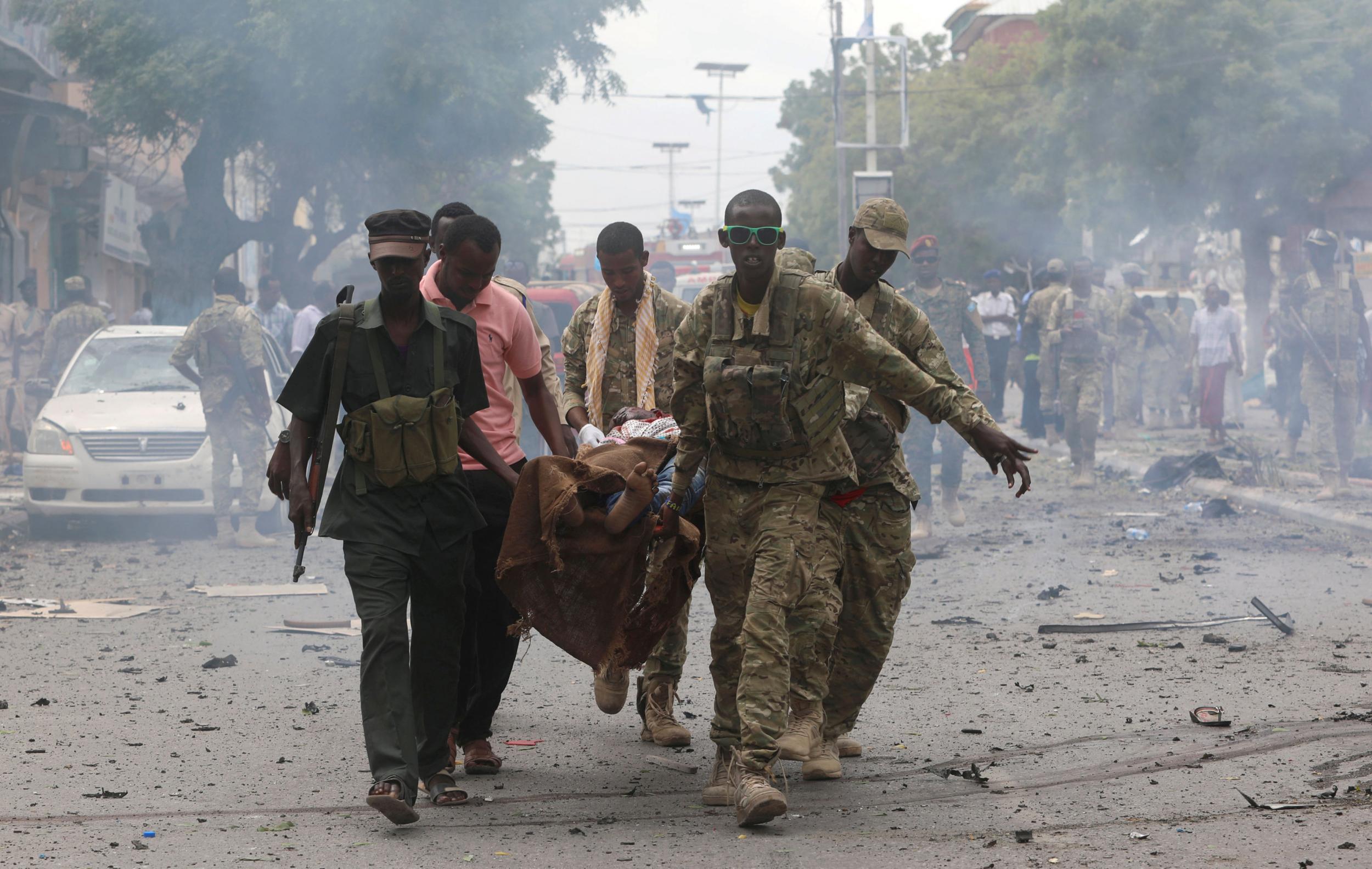Somalia bomb attacks: Death toll rises to 231 after huge blast in Mogadishu
Somali authorities declare three days’ mourning for country’s deadliest-ever bomb attack

Your support helps us to tell the story
From reproductive rights to climate change to Big Tech, The Independent is on the ground when the story is developing. Whether it's investigating the financials of Elon Musk's pro-Trump PAC or producing our latest documentary, 'The A Word', which shines a light on the American women fighting for reproductive rights, we know how important it is to parse out the facts from the messaging.
At such a critical moment in US history, we need reporters on the ground. Your donation allows us to keep sending journalists to speak to both sides of the story.
The Independent is trusted by Americans across the entire political spectrum. And unlike many other quality news outlets, we choose not to lock Americans out of our reporting and analysis with paywalls. We believe quality journalism should be available to everyone, paid for by those who can afford it.
Your support makes all the difference.The death toll from the most powerful bomb blast witnessed in Somalia’s capital Mogadishu has risen to 231 with more than 275 injured, a senator has said.
Police said a truck bomb exploded outside the Safari Hotel at the K5 intersection, which is lined with government offices, restaurants and kiosks, flattening buildings and setting vehicles on fire. A separate blast struck the Medina district two hours later.
Abshir Abdi Ahmed said the toll comes from doctors at hospitals he has visited in Mogadishu. Many of the bodies in hospital mortuaries have not yet been identified, he said.
It is the single deadliest attack ever in the Horn of Africa nation.

Dr Afzal Ashraf, assistant professor of international relations at the University of Nottingham, told The Independent the attack was likely a response to recent losses suffered by Islamist groups.
He said groups affiliated with al-Qaeda and Isis were “increasingly on the back foot, particularly in Iraq and Syria, and feel they need to lash out.”
More than 200 were injured in the explosion outside the hotel and hospitals are struggling to cope with the high number of casualties.
Officials feared the death toll would continue to climb. Many died at hospitals from their wounds, Police Captain Mohamed Hussein said.

The Red Cross said four volunteers with the Somali Red Crescent Society are among the dead and warned “this figure may rise as there are a number of volunteers still missing.”
Overnight, rescue workers with torch lights searched for survivors trapped under the rubble of the largely destroyed Safari Hotel, which is close to Somalia’s foreign ministry. The explosion blew off metal gates and blast walls erected outside the hotel.

President Mohamed Abdullahi Mohamed declared three days of mourning and joined thousands of people who responded to a desperate plea by hospitals to donate blood for the wounded victims. “I am appealing all Somali people to come forward and donate,” he said.
Angry protesters took to the streets in Mogadishu a day after the massive truck bomb attack.
Somalia’s government blamed the al-Qaida-linked al-Shabaab extremist group for the attack it called a “national disaster.” However, al-Shabaab, which often targets high-profile areas of the capital with bombings, had yet to claim the attack.
“They don’t care about the lives of Somali people, mothers, fathers and children,” Prime Minister Hassan Ali Khaire said. “They have targeted the most populated area in Mogadishu, killing only civilians.”
Somalia’s information minister, Abdirahman Omar, said the blast was the largest the city had ever seen. “It’s a sad day. This is how merciless and brutal they are, and we have to unite against them,” he said, speaking to the state-run radio station.
The US joined the condemnation, saying “such cowardly attacks reinvigorate the commitment of the United States to assist our Somali and African Union partners to combat the scourge of terrorism.”
America has stepped up drone strikes and other efforts this year against al-Shabaab, which is also fighting the Somali military and the more than 20,000-strong African Union forces in the country.
Join our commenting forum
Join thought-provoking conversations, follow other Independent readers and see their replies
Comments